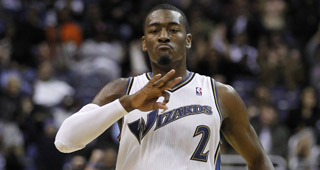While much of the pre-draft speculation has revolved around the teams in the top-3, the Washington Wizards, at No. 6, have the most at stake in the 2011 Draft.
With many of college basketball’s top players staying in school because of the potential upcoming lockout, it’s doubtful any of this year’s top prospects are franchise-type talents, guys who could become the best player on a championship team. On the rosters of teams drafting in the top-10, the only player who fits that description is Wizards point guard John Wall, the No. 1 overall selection last season.
But having an All-NBA player is only the first step towards building a title team. No one player can win a championship, and the top of the draft is the best way to acquire the All-Star caliber talent necessary to become a great team. That creates a small window for a team to build around a franchise player -- as he improves, the team’s chances of selecting in the top 10 diminish, and once he’s eligible for a big-money contract extension, their salary cap room disappears.
Superstars leaving in free agency have dominated headlines after “The Decision”, but poor management, not market size or personal character, has been the biggest reason why players have left the teams that drafted them.
After drafting LeBron James, the Cavaliers only had one more shot at the lottery before becoming a playoff team, taking Luke Jackson at No. 10 in 2004. With no other young players to build around, they panicked in free agency, blowing their cap space on Larry Hughes and Donyell Marshall. By 2010, the end-results of those decisions -- an aging, capped-out roster with little ability to improve internally -- made LeBron’s decision almost inevitable.
The Raptors, after drafting Chris Bosh in 2003, had lottery picks the next three seasons. Those selections -- Rafael Araujo in 2004, Charlie Villanueva in 2005 and Andrea Bargnani in 2006 -- ensured that Toronto had little chance of ever building a championship roster around Bosh.
In contrast, Oklahoma City picked Russell Westbrook, Serge Ibaka and James Harden in the years after drafting Kevin Durant, while Chicago had a young nucleus of Joakim Noah, Luol Deng (acquired before the 2008 Draft) and Taj Gibson to put around Derrick Rose. Because of their ability to find talented players in the draft, the Thunder and the Bulls are two of the most promising young teams in the NBA.
With Wall, a blazing fast 6’4 195 guard who averaged 8.3 assists to only 3.5 turnovers as a 20-year old rookie, and Javale McGee, a 7’0 shot-blocking dynamo with a 7’6 wingspan and a vertical over 30 inches, the Wizards have offensive and defensive cornerstones. Their two selections this year -- No. 6 and No. 18 -- are golden opportunities to surround them with good young players at the other three positions.
Neither Wall nor McGee is a great outside shooter, so Washington should avoid any top prospect who can’t stretch the floor. Their two big needs long-term are a second shot-creator and a big man with the ability to rebound, defend power forwards and hit an outside shot.
By 2013, with Wall in his third year and McGee in his fifth, Washington will be a playoff contender with two young players looking for big-money contracts; they’ll have a lot less roster flexibility than they do right now.
If they aren’t careful, they could end up in a situation like Orlando or New Orleans, unable to build a team capable of contending and facing the possibility of losing a top-10 player to free agency in the prime of their career. The Magic, after taking Fran Vazquez and JJ Redick with consecutive lottery picks and giving Rashard Lewis $118 million, don’t have much room to improve their roster; the Hornets are in a similar boat after drafting Hilton Armstrong and Julian Wright and dumping JR Smith and Tyson Chandler for pennies on the dollar.
In the NBA, with guaranteed contracts and a reverse-order draft, it’s extremely difficult to outrun your past. Decisions made in 2005 and 2006 could spell disaster for Orlando and New Orleans in 2011.
If the Wizards blow these next two drafts, they’ll have a second-round ceiling and a young superstar looking for the exits. If they can unearth two All-Star caliber players, they’ll challenge Miami and Chicago for long-term supremacy in the East. No pressure.

Jonathan Tjarks wrote on the NBA for RealGM from 2011-2016 before joining The Ringer.
Follow @JonathanTjarks on Twitter.


